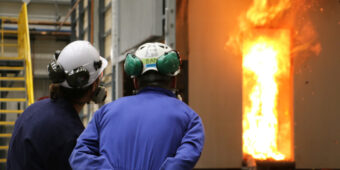The LBP code of ethics in practice
21 Sep 2023, LBP & Regulation, Learn, Prove Your Know How

The Licensed Building Practitioners (LBP) Code of Ethics (COE) came into force on 25 October 2022. It is a tool that sets clear standards for how LBPs should conduct themselves. In this article, we will look at some examples of it in action that you may recognise on site, or in your dealings with clients
Over the next few issues of Codewords, we will put a spotlight on each of the principles, what they mean and provide some examples. We are working to develop some more specific examples for design LBPs – so watch this space!
The COE applies to all LBPs regardless of whether they are employed, are the employer, or are contractors. The majority of LBPs already meet these standards, but the introduction of the COE will hold those to account who do not.
As all LBPs should know by now, the COE contains 19 standards, which sit under four principles.
Principle 1: Work safely
1.You must take responsibility for health and safety.
2.You must report unsafe behaviour by others on a building site.
3.You must avoid harming the environment.
Principle 2: Act within the law
4.You must comply with the law.
5.You must report breaches of the law.
Principle 3: Take responsibility for your actions
6.You must be knowledgeable about what you are allowed to do.
7.You must explain risks to your client.
8.You must inform and educate your client.
9.You must be accountable.
10.You must advise clients of any delays as soon as they become apparent.
11.You must act in your client’s interests.
12.You must normally follow your client’s instructions.
Principle 4: Behave professionally
13.You must behave professionally.
14.You must act in good faith during dispute resolution.
15.You must price work fairly and reasonably.
16.You must declare and manage actual or potential conflicts of interest appropriately.
17.You must maintain confidentiality of client details unless there is good reason for sharing information.
18.You must acknowledge and respect cultural norms and values of clients and colleagues.
19.You must conduct business in a methodical and responsible manner.
Work safely
Everyone on a building site knows they need to take reasonable steps to make sure the work they are doing does not endanger the health and safety of themselves, their colleagues, and anyone else that may be on-site. The COE requires LBPs to ensure that they are meeting their health and safety responsibilities.
For example, if they see someone using a power tool without the proper guarding in place, or not wearing their PPE, they need to let that person know that it is not safe. If the behaviour continues, the LBP needs to take other appropriate action, such as escalating it to the site foreperson or supervisor.
You should always take steps to prevent harming the environment. Again, if the LBP sees someone doing this, they must also report it. This may be to the person doing it, or a supervisor. For instance, the concrete truck driver is about to wash down the chute where the runoff will go onto the road or a neighbouring property. It is as simple as asking them to stop and directing them to the designated washdown area.
Act within the law
An important thing to note for this and the following standards is the level of responsibility the LBP holds. If they are employed, then their obligation is to their employer’s directions. If they are self-employed, then their obligation is to the matters that they are responsible for carrying out, or supervising, to the person who engaged them.
The first standard under this principle, says that you must comply with the law. There are several laws that apply here, so it would be unrealistic to expect an LBP to know these off by heart.
It would be expected, however, that an LBP is aware that all building work is covered by law and would need to know their obligations and responsibilities under those laws. Knowing where to look or having someone that could show them where to look is important. By following plans and site documentation, many of these laws are already being complied with.
Any valid complaints about LBPs go to the Building Practitioners Board for consideration. The Board members have a mix of skills, including industry expertise in design, construction and inspection, law, dispute resolution, and mediation. They are a pragmatic group of people and look at complaints from a real-world perspective.
Links to those relevant laws can be found here: lbp.govt.nz/assets/lbp/documents/guidelines/code-of-ethics-guidelines-for-lbps.pdf .
The second standard under this principle is the duty to report breaches of the law. If an LBP becomes aware of someone breaching the building laws, they must report it to the appropriate person – whether it is the person themselves or someone supervising or managing the site. If the breach continues, then they must escalate the report to someone at a higher level.
An example of this might be that an LBP notices that the blocklayer has not put the horizontal reinforcing in the first course of blocks as per the plans and has started laying the second course. As this is a breach of the building consent and therefore the Building Act, it needs to be reported. The easiest way of doing this is to point it out to the blocklayer before he or she gets too far ahead. If the response is that they are not going to do this, the next step is to talk to the person in charge of the site.
A future article will continue with the next principle: Take responsibility for your actions.
Register to earn LBP Points Sign in
2 Comments
Leave a Reply
You must be logged in to post a comment.




very`helpfull
helpful